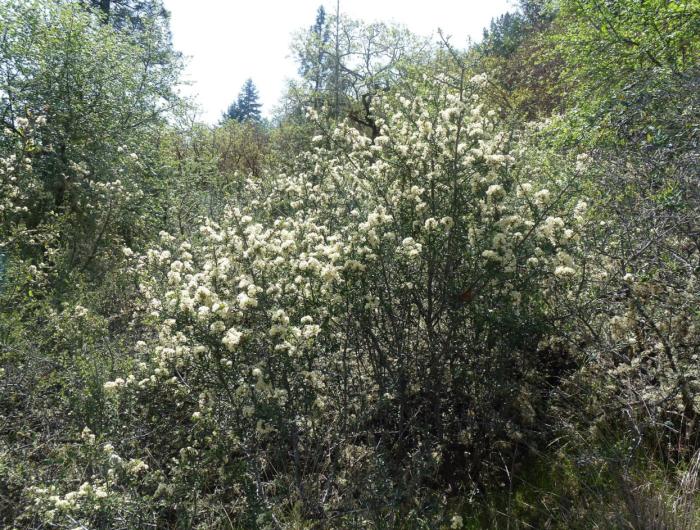
Ceanothus cuneatus
Buck Brush

Description
Ceanothus cuneatus is a species of flowering shrub in the Rhamnaceae (Buckthorn) family known by the common names Buckbrush and Wedgeleaf Ceanothus. This Ceanothus is native to Oregon, California, and northern Baja California, where it can be found in a number of habitats, especially chaparral. It is one of the most common and widespread native plants in California. It is a spreading bush, rounded to sprawling, reaching up to 3 meters in height. The evergreen leaves are stiff, tough and fleshy, and may be slightly toothed along the edges. The bush flowers abundantly in short, thick-stalked racemes bearing rounded bunches of tiny flowers, each about half a centimeter wide. The flowers are white, sometimes tinted strongly with blue or lavender.
Plant Type
Shrub, Ground cover
Height Range
6-12'
Width Range
6-12'
Flower Color
White
Flower Season
Winter, Spring, Summer
Leaf Color
Green
Bark Color
n/a
Fruit Color
n/a
Fruit Season
n/a
Sun
Full, Half
Water
Low
Growth Rate
Slow
Soil Type
Sandy, Loam, Rocky
Soil Condition
Average, Well-drained
Soil pH
Neutral
Adverse Factors
n/a
Design Styles
Meadow, Mediterranean, Ranch, Seascape, Spanish
Accenting Features
Fragrance, Showy Flowers
Seasonal Interest
Winter, Spring, Summer
Location Uses
Entry, Shrub Border, Foundation, Parking Strip, Patio, Park, Parking Lot, Raised Planter, Roadside, Walkways, With Rocks
Special Uses
Cascade, Erosion Control, Filler, Mass Planting, Lawn Substitute, Fire Resistant, Naturalizing
Attracts Wildlife
Hummingbirds, Butterflies
Water Saving Tip:
Replace turf with groundcovers, trees, and shrubs.
If you have areas where no one uses the grass, patches that do not grow well, or a turf area too small to water without runoff, consider replacing the turf with water-efficient landscaping.